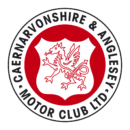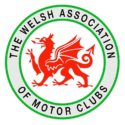The first Annual General Meeting took place on the 14th May 1936 when the club rules were agreed. These included confirmation of the club name, the annual subscription of two shillings and sixpence (12½ pence in today’s coinage), and ladies being admitted as full members. Altogether some 27 rules were voted on, including a ban on the use of competition tyres – still topical after all these years!
From the start the club was open to either sex and eligible vehicles included cars and motor cycles. During these first few years the members organised reliability trials, navigation runs, social runs, and various charitable activities including an outing for local “poor children” with food and lemonade for tea. At the AGM in 1939 it is recorded that the ‘Palferman Challenge Trophy’ was presented to the club by Mr. J Palferman
The club’s activities were soon suspended by the outbreak of World War 2 when many club members were called up for active service, and it was not until the end of the war that it was reformed by some of the original members. In the 1950’s the Club’s activities included Social Runs on the first Sunday each month, Driving Tests, Car Trials, and Road Rallies. Among the most popular (notorious?) of the rallies was the “Farmyard Frolics” organised by David Lloyd, which visited most of the local farmyards and private land ensuring plenty of ‘not as map’ tests with muddy roads and tracks to drench the cars and confuse the competitors!
In 1958 and 1959 the first Gwynedd Rallies were organised; these were all-night road rallies of some 250 to 300 miles with two different starting points leading to a petrol halt where the routes joined together ready for the competitive night sections. These were the days before the “Motor Vehicles (Competitions and Trials) Regulations 1969” were even thought of, and were very tough events.
Motorsport soon became more competitive with regional and national championships and the club started to organise Restricted status rallies, starting with the Regent Rally in 1966. In 1970 the Regent Rally was transformed into the Gwynedd Rally, still a road rally but gradually developing into a new format with evening stages over farm tracks etc followed by a full night rally of long selective sections. The 1973 Gwynedd Rally was a qualifying round of the Ford Mexico Championship and was won by a certain Russell Brookes navigated by Neil Wilson.
Other events organised by the club during this period included the Palferman Rally, the J.J.Brown Rally and the Kennings Autotest, which were all developing into Restricted status events in their own right. But the crucial change came in 1975 when, after two years of negotiations and planning, the Gwynedd Rally took to the forests and became the first Restricted Forest Rally to be run in North Wales by a local club. It was sponsored by Alan Milburn in the local Esso Garage and called the Uniflo Gwynedd Stages Rally, using 45 forest stage miles for a £15 entry fee, within a total distance of 190 miles.
When the Gwynedd Rally became a daylight forest event, the J.J.Brown Rally took its place as the club’s premier night road rally and went on to become an established event in the Motoring News Rally Championship and, running in December, was therefore the last MN Championship Event to be held in the UK. Also the Glyn Memorial Rally was born as a single venue Stage Rally held at the new circuit constructed at Ty Croes in Anglesey.
In 1977 the Gwynedd Rally became part of the Castrol Autosport Championship and developed as a National status event through various sponsors, including Skip Brown Cars from 1984 to 1989. In 1990 Vauxhall took over as main sponsors and the rally gained International Status in 1992 and became part of the British Rally Championship. The Vauxhall Rally of Wales became a round of the FIA European Rally Championship in 1995 and 1996, and a highly successful partnership with Vauxhall continued until 2000, when they withdrew to concentrate on their racing activities in the BTCC.
Continuing the Rally of Wales without a long-term main sponsor became very difficult, not helped by the Foot-and-Mouth outbreak in 2001 which caused the event to be cancelled only two weeks before the start. This left the club with a major financial deficit, and although it struggled on until 2005, the demands of the British Rally Championship saw the end of the road for the International Rally of Wales.
However, even as one event struggles another is born, and the Tour of Anglesey Historic Rally began with a different organising team. This concentrated on Special Tests on private land with a night section of road rallying to follow - similar to the format of the early Gwynedd Rallies but for historic/classic cars that would not have been too out of place on that event of the early 70s.
With another blast from the past, the Kenning’s Autotest is once again part of the BTRDA Championship and increasing in popularity, while the Glyn Memorial Stage Rally (named after a previous President of the Club) is a qualifying event for the WAMC and ANWCC Championships and is attracting many good entries at the Anglesey Racing Circuit.




